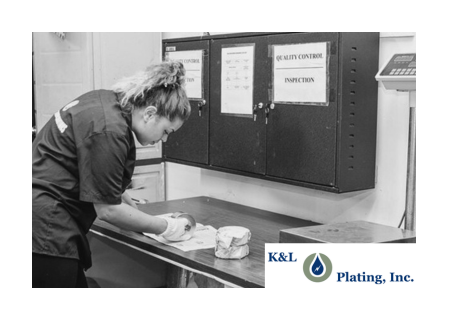HTF would like to spotlight K&L Plating as a trusted partner. K&L Plating was founded in 1955, serving customers on both a local and global scale. They are dedicated to precise work and excellent customer satisfaction with their plating work and engineering consulting.
K&L Plating often helps its customers solve complex engineering problems through consultations where they make recommendations to ensure superior durability. Let’s dive deeper into their plating services.
What Is Electroless Nickel-Plating?
Electroless nickel-plating is a corrosive-resistant coating over metal without an electrical current. It applies a uniform coating over even the most challenging surfaces. Using this method ensures consistent coverage and protection. K&L Plating can handle any size order, and its films and coatings meet rigorous military and ASTM specifications.
5 Things You Should Know About Electroless Nickel-Plating
1. Benefits of Electroless Nickel-Plating
One significant benefit of electroless nickel-plating is that it enables complex structures to receive an even, consistent protective coating. This coating prevents corrosion, limits the need for liquid lubrication, and decreases the overall wear. Many industries depend on electroless nickel-plating to protect their essential components.
2. The Electroless Nickel-Plating Process
When beginning electroless nickel plating, the first step is pretreatment pickling. This cleans impurities from the metal surface. Next, the material is put through an activation process, preparing the substrate for the nickel deposit.
Finally, the nickel is applied using a reducing agent to ensure a reaction. Sometimes it is necessary to use heat treatment to harden the nickel deposit. Heat is used for baking the substrate for hydrogen embrittlement relief.
3. Considerations for Electroless Nickel-Plating Services
Electroless nickel-plating is extremely hard because it is less porous than electroplated nickel. It is more resistant to common corrosives such as salt water, carbon dioxide, oxygen, and hydrogen.
The electroless nickel-plating process deposits an even coating on the components. The thickness can be tightly controlled for engineered coatings. These are free from edge buildup. Even complex geometries can be evenly coated with electroless nickel-plating.
4. Common Applications of Electroless Nickel-Plating
There are many applications for which electroless nickel-plating is the best option. The aerospace industry uses it for flight-critical components. This is due to their resistance to corrosion and wear.
The oil and gas industry uses electroless nickel-plating on pumps in underwater and underground applications. It is used on engine shafts for railroad trains and engine components for heavy equipment. The automotive industry uses electroless nickel-plating for pistons, cylinders, gears, and moving parts.
5. Advantages of K&L Plating’s Electroless Nickel-Plating
There are many benefits to using K&L Plating’s electroless nickel-plated components. Their products meet MIL-C 26074E specs (Class 1-4). Their internal quality assurance is highly precise and fulfills ASTM and MIL-SPEC requirements, which are administered and inspected in an accredited laboratory. K&L Plating also has automated plating lines, allowing them to get products out the door quickly.
HTF and K&L Plating
Electroless Nickel-Plating is an excellent choice for cost-efficient plating of intricate structures. It provides corrosion resistance and durability. K&L Plating has rigorous standards which guarantee they can engineer a high-performing plated component to meet your needs.
HTF is proud to partner with K&L Plating to offer your needed components quickly. HTF offers same-day shipping on all orders placed by 3 p.m. Eastern. You can trust HTF to handle the heavy lifting when ordering electroless nickel-plated components. Request a quote today.









